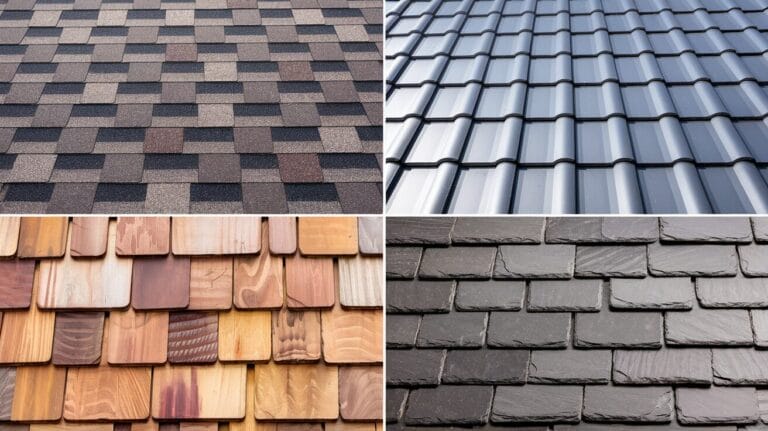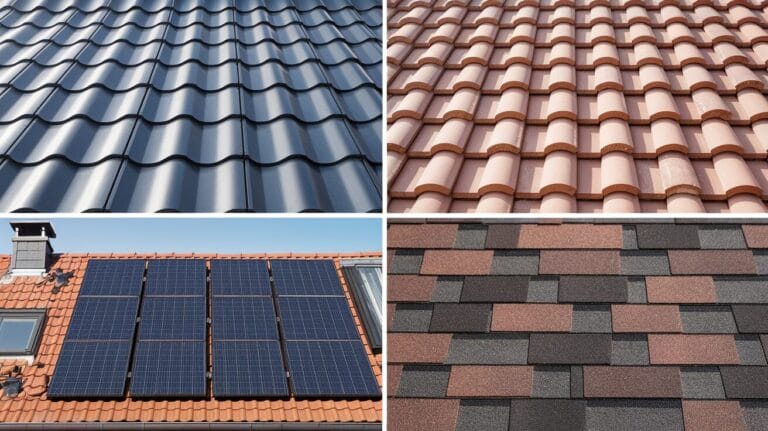
When it comes to roofing materials, homeowners have a variety of options to choose from. Two popular choices are synthetic roofs and asphalt shingles. Both options have their own unique features and advantages. In this blog post, we will compare synthetic roofs to asphalt shingles in terms of cost, installation process, performance and durability, energy efficiency, aesthetics, maintenance requirements, and environmental impact.
By understanding the differences between these two roofing materials, homeowners can make an informed decision when it comes to selecting the right option for their needs.
Synthetic roofs
Synthetic roofs, also known as composite roofs, are made from a combination of materials such as plastic, rubber, or polymer. These roofs are designed to replicate the look and texture of natural materials like wood or slate. One of the main advantages of synthetic roofs is their versatility in terms of design and color options.
Homeowners can choose from a wide range of styles that can match their architectural preferences. Additionally, synthetic roofs are known for their lightweight nature, which makes them easier to install and transport compared to other roofing materials.
Asphalt shingles
Asphalt shingles, on the other hand, have been the traditional choice for many homeowners for decades. They are made from a base of fiberglass or organic material, covered with a layer of asphalt and ceramic granules. Asphalt shingles are known for their affordability and ease of installation. They come in a variety of styles and colors, providing homeowners with options that suit their preferences.
Additionally, asphalt shingles are durable and can withstand various weather conditions, making them a popular choice for many residential properties.
Cost Comparison
In terms of cost, asphalt shingles are generally more affordable compared to synthetic roofs. The price of asphalt shingles can vary depending on the quality and brand. On the other hand, synthetic roofs tend to be more expensive due to the higher manufacturing costs and the materials used. However, it’s important to consider the long-term value and lifespan of the roofing materials when comparing costs. While synthetic roofs may have a higher upfront cost, their durability and longevity can make them a cost-effective option in the long run.
Installation process
The installation process for synthetic roofs can be more complex compared to asphalt shingles. Synthetic roofs often require professional installation, as they may need special techniques and equipment. On the other hand, asphalt shingles can be installed by experienced homeowners or roofing contractors.
The ease of installation for asphalt shingles makes them a popular choice for DIY enthusiasts. It’s important to consider the skills and expertise required for installation when choosing between synthetic roofs and asphalt shingles.
Performance and durability
Both synthetic roofs and asphalt shingles offer good performance and durability, but they have different strengths. Synthetic roofs are known for their resistance to extreme weather conditions such as strong winds, hail, and UV rays. They are also highly resistant to fading, cracking, and warping, which can extend their lifespan.
On the other hand, asphalt shingles are known for their durability and ability to withstand harsh weather conditions. They are also fire-resistant and can provide good insulation for homes. Homeowners should consider their local climate and weather patterns when selecting the roofing material that offers the best performance and durability for their specific needs.
Energy efficiency
When it comes to energy efficiency, synthetic roofs have an advantage over asphalt shingles. Synthetic roofs are designed to reflect sunlight and heat, reducing the amount of heat transferred into the home. This can result in lower energy consumption for cooling, especially in hot climates.
In contrast, asphalt shingles absorb heat, which can increase the energy needed for cooling the home. Energy efficiency should be considered, especially in regions with high energy costs or a focus on sustainability.
Aesthetics
Aesthetics play a significant role in choosing a roofing material. Synthetic roofs offer a wide range of design options, closely resembling natural materials like wood shakes or slate tiles. They can enhance the overall appearance of a home and can be customized to match the architectural style.
On the other hand, asphalt shingles also come in various styles and colors. They are a popular choice for homeowners who prefer a more traditional look. The decision between synthetic roofs and asphalt shingles will depend on the homeowner’s personal preferences and the desired aesthetic appeal of their home.
Maintenance requirements
Maintenance requirements differ between synthetic roofs and asphalt shingles. Synthetic roofs generally require less maintenance compared to asphalt shingles. They are resistant to mold, algae growth, and insect infestation, which reduces the need for regular cleaning. Synthetic roofs may require occasional inspections and cleaning to maintain their appearance and functionality.
Asphalt shingles, on the other hand, may need periodic cleaning to remove debris and prevent the growth of moss or algae. Additionally, they may require occasional repairs or replacement of damaged shingles. Homeowners should consider the level of maintenance they are willing to undertake when selecting their roofing material.
Environmental impact
In terms of environmental impact, synthetic roofs have a more favorable profile compared to asphalt shingles. Synthetic roofs are often made from recycled materials and can be recycled at the end of their lifespan, reducing waste in landfills. They also require less energy and resources to manufacture compared to asphalt shingles.
On the other hand, asphalt shingles are not recyclable and contribute to environmental waste. However, some manufacturers have started producing asphalt shingles with higher recycled content, which can help reduce their environmental impact. Homeowners concerned about sustainability should choose roofing materials that minimize their carbon footprint and contribute to a greener future.



